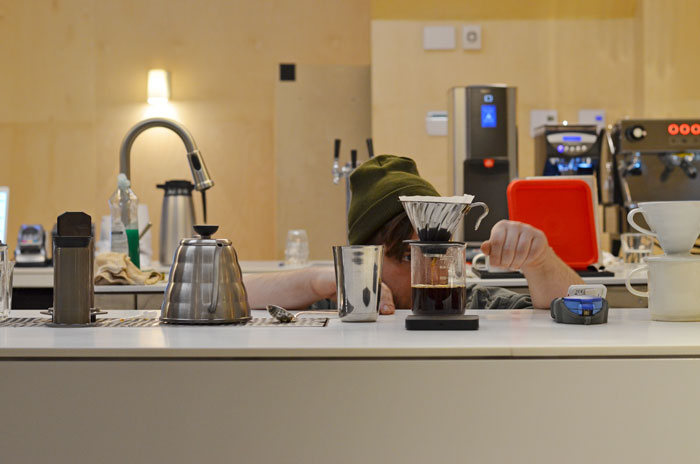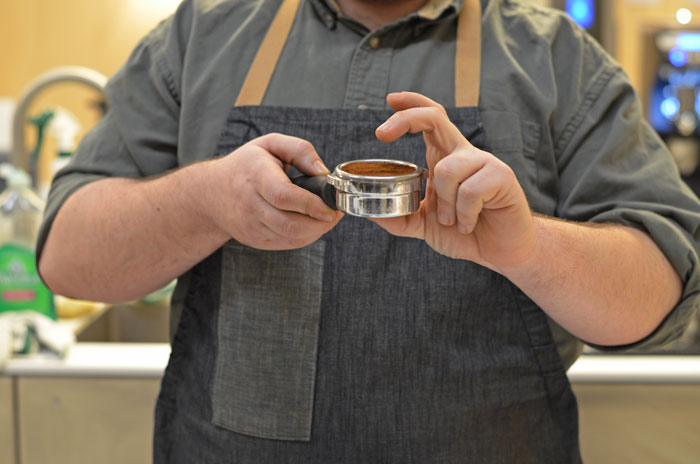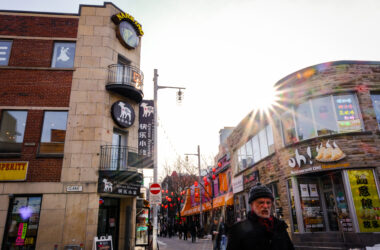According to the Coffee Association of Canada, in 2016, over 58 per cent of Canadians aged 18-24 drank coffee on a daily basis, a number that grows every year. It is clear that coffee has become a staple of Montreal life; from the famous Tim Hortons to the lesser-known independent coffee shops in the Plateau, there seems to be a never-ending choice of places to get that daily caffeine boost. However, this makes it difficult for third-wave coffee companies to stand out among the crowd.
‘Third-wave coffee’ is a movement based on the idea that coffee is more than just a commodity. For those who follow its tenants, all stages of production, from the growing to the brewing of coffee beans, are done meticulously. There is often a focus on the experience of coffee drinking itself, and as such, many baristas put effort into other drink elements, such as latte art and alternative brewing methods.
To support this love of coffee, the beloved Montreal-based Dispatch Coffee has begun offering free workshops at its new location in the Plateau on Rue St-Laurent and Avenue Duluth. These workshops give customers the opportunity to discover where their coffee comes from and to learn new brewing methods.

Every Thursday from 4-7 p.m., the Director of Coffee at Dispatch, Chris Durning, introduces attendees to a different brewing method. The most recent demonstration on Feb. 2 focused on the V60 pour-over method. A funnel-shaped device filled with freshly ground coffee is placed over a cup, then water is poured over the top in concentric circles so that it filters evenly into the cup below.
There is a significant amount of chemistry involved in the brewing process. The balance of acidity, sweetness, and bitterness of a cup can be significantly altered depending on how it is brewed, and finding the ideal ratio is a detailed process. Specific aspects of coffee making—such as the temperature of the water, how fine the coffee has been ground, and the ratio of coffee to water in the brew—can be the difference between a good cup of coffee and a bad one.
“I always like to say making coffee is like making a cocktail, you’re trying to balance all of these flavours,” Durning said.
Dispatch works exclusively with high quality ethically-sourced coffee from all over the world, and each kind is chosen for its unique blend of scents. The Rwandan Kanzu coffee sold by Dispatch is described as ‘sweet and comforting,’ while the Peruvian Amaybamba coffee beans are also fairly sweet, but have hints of deeper chocolate and nutty aromas. Durning invites workshop observers to taste the freshly brewed coffee, helping them to identify these subtle, distinct smells during his demonstrations.
These beans, roasted in Montreal, are light-roasted to retain as many nutrients as possible and preserve their high quality and complex flavours. The effort of roasting the coffee locally clearly shows the care and expertise that Dispatch puts into their products. This is also reflected in the free workshops, which go above and beyond to improve the customer experience.
At the end of the workshop, Durning also hands out recipe cards with specific instructions on how to replicate the brewing methods at home.
“By giving you recipes that we’re actually roasting for, it’s making sure you’re in the ballpark already,” Durning said. “Then, by teaching you how to manipulate the flavour, you can adjust it so that it tastes perfect and you’re wasting less coffee. That’s the biggest thing for us.”
Though there are many secrets to brewing the perfect cup of coffee, Dispatch provides an easy and enjoyable avenue to understand the fundamentals. Durning’s workshops make the complex world of coffee brewing more accessible—plus, the free coffee makes the educational experience all the more gratifying.
A previous version of this article incorrectly stated that Chris Durning is Head Roaster at Dispatch, and that Dispatch exclusively sells fair trade coffee. In fact, Chris Durning is Director of Coffee at Dispatch, and Dispatch sells exclusively ethically-sourced coffee, though not all of this is fair trade. The Tribune regrets these errors.









